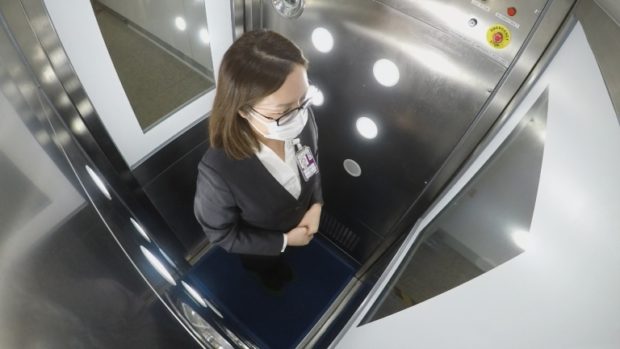
Hong Kong International Airport’s disinfection booth. Image: Hong Kong International Airport via AFP Relaxnews
Hong Kong International Airport is trialing a new full-body disinfection booth that involves a temperature check and a 40-second disinfection procedure.
The airport hub says it’s the first to trial CleanTech, an enclosed booth similar in concept to a tanning booth. Only, instead of spraying fake tan, the nozzles spray people down with a disinfectant for 40 seconds to kill any trace of the virus.
The surface of the booth features an antimicrobial coating that purports to “remotely kill the virus and bacteria on human bodies and clothing.”
The booth is currently being trialed among airport staff.
The airport is also conducting a pilot test using antimicrobial sprays for high-touch surfaces in the terminal, including handles and seats on the Automated People Mover, passenger buses, smart check-in kiosks, check-in counters, toilets, seating areas, baggage trolleys and elevator buttons.
And autonomous cleaning robots have also been deployed to disinfect public areas and passenger facilities throughout the airport. The robots use ultraviolet light to sterilize 99% of surfaces like public toilets and can also sterilize the air.
Major airlines have begun introducing their own precautionary measures at their home airports. Emirates has begun conducting coronavirus blood tests for passengers leaving from Dubai. The tests are conducted by the Dubai Health Authority and results are ready in 10 minutes.
Etihad Airways has installed self-serve, contactless kiosks that can flag at-risk travelers by monitoring their temperature, heart rate and respiratory rate.
Along with more stringent disinfection practices, it looks increasingly likely that once air travel resumes at a large scale, travelers and staff will be required to wear face coverings and masks in a bid to stop the spread of germs. In recent weeks, a slew of airlines including JetBlue, Lufthansa and Air Canada announced that travelers will be required to wear masks throughout their journey. JB
RELATED STORIES:
The newest addition to flight attendant uniforms: The face mask
‘The Greta Effect’ to shape the future of travel